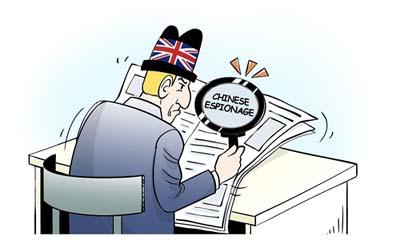
Britain’s ‘China threat’ theory methods are stuck in the Victorian era
Ding Gang
The irony is palpable as the once mighty British Empire, now restless and on edge, fears a small military badge made in China. This badge, a symbol of a new era under King Charles III, has become a source of anxiety. The British military has even delayed its distribution, concerned that these badges might be manufactured in China and embedded with tracking devices.
Reading this report from the Financial Times, one might wonder if the British feel like they are back to the early 20th century when the “Yellow Peril” theory was rampant. However, today, the world is unlikely to be deceived by such absurd political assumptions and understands the need for a more nuanced and updated view of China.
During the era when the “Yellow Peril’ theory was rampant, British literature, news reports, and missionary records often portrayed China as ignorant, inferior, and evil – a target to be suppressed and conquered. Understanding this historical context can shed light on the current perceptions of Chinese-made products.
This narrative that disparages China served as a mirror reflecting the “greatness and dignity” of the British Empire. The renowned scholar of Orientalism, Edward Said, aptly noted, “The Orient has helped to define Europe (or the West) as its contrasting image, idea, personality, experience.” So, what image of Britain is being defined this time through a Chinese-made badge? It’s an old empire fearful of globalization, gradually outdated yet unwilling to catch up. Also, another image is a helpless gentleman, a “petty man” always projecting his sordid mindset onto others.
In the era of our global village, the British have seamlessly integrated “Made in China” products into their daily lives. These products have enriched their lives and ushered in a new, modern era of high-quality, affordable goods for the British public to enjoy.
According to bilateral trade data between China and the UK, the UK imports many products from China, including computers, mobile phones, toys and household appliances. So, could a smartphone imported from China contain a miniature surveillance device? Could a small toy car for children hide a spy camera? And what about those household appliances? Thinking along these lines could indeed make the British nervous and uneasy.
Suppose a serious investigation were conducted. British authorities might need to mobilize the entire nation to dismantle every appliance, piece of furniture, and toy made in China to search for “the Monitor.” Finally, they could decide whether these items could become “strategic weapons” by China to attack the UK.
Enough! It’s important to recognize that some in the UK are amplifying the “China threat” theory for their own political gain. However, their methods are outdated and out of touch.
This is akin to “using a horse and buggy in the age of cars,” meaning to use outdated methods in a modern era. Our genuine concern is what impact it would have on China-Britain relations if those who try to continue using the horse and buggy were to formulate policies on China, a China on a high-speed train toward a new era.
Today’s China is no longer the China of the Victorian era, and the UK is no longer the empire on which the sun never sets. Opening doors and windows and looking at each other with clear eyes is the key to forming a correct understanding and perception and ensuring that one does not fall off the fast-moving train of the times. This reassurance should alleviate any concerns about the “China threat” theory.
In today’s world, the storyline has long been renewed, so shouldn’t the storytellers also change their approach?
The writer is a senior editor with the People’s Daily, and currently a senior fellow with the Chongyang Institute for Financial Studies at the Renmin University of China
